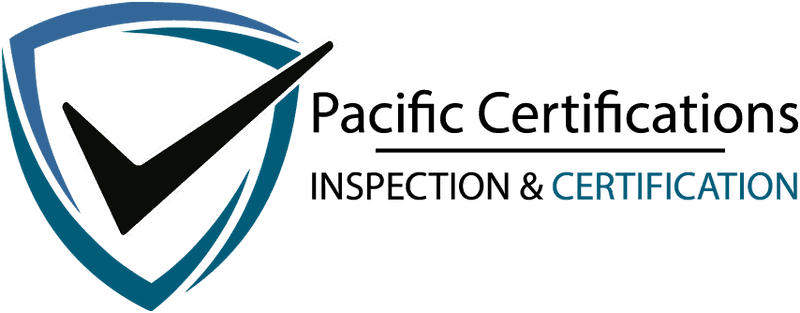ISO Certifications for Pesticide Manufacturing Businesses, Requirements and Benefits
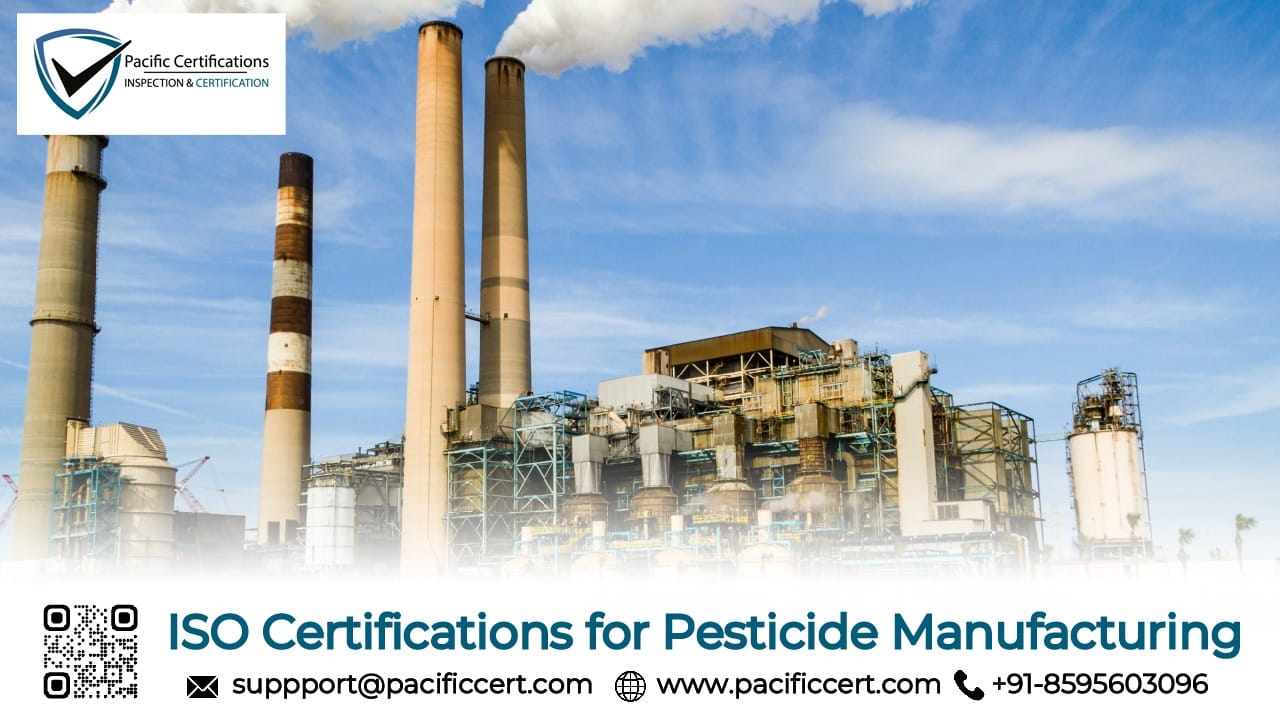
ISO Standards for Pesticide Manufacturing
Introduction
Pesticide manufacturing involves handling hazardous chemicals, strict safety, environmental, and regulatory constraints. To ensure product quality, environmental responsibility, worker safety, and market credibility, pesticide manufacturers benefit tremendously from adopting internationally recognized ISO standards.
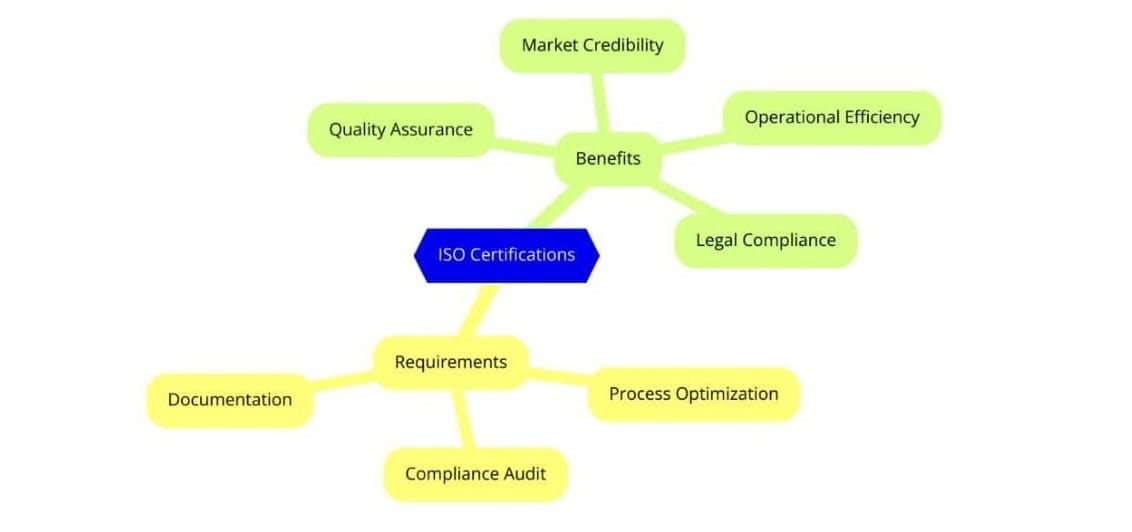
ISO standards provide a framework that promotes consistent quality and environmental stewardship. These globally recognized certifications ensure that manufacturers operate responsibly and maintain trust among consumers and stakeholders.
For pesticide manufacturers, achieving ISO certification signifies compliance with international best practices but also sets your company apart.
If you are seeking ISO certification for your pesticide manufacturing business, reach out to us at [email protected] or call +91-8595603096.
Applicable ISO Standards for Pesticide Manufacturing
The pesticide manufacturing industry is governed by a variety of ISO standards, each addressing specific aspects of quality and environmental management.
Below are the most applicable certifiable standards:
ISO 9001 (Quality) | Certifiable | Ensures consistent quality, defect reduction, process control in chemical production |
ISO 14001 (Environmental) | Certifiable | Manages emissions, waste, effluent, resource usage, and environmental compliance |
ISO 45001 (Occupational Health & Safety) | Certifiable | Protects workers from chemical hazards, promotes safe handling and workplace safety |
ISO 17025 (Testing & Calibration) | Certifiable | Validates lab competence for testing pesticide purity, efficacy, contaminants |
ISO 26000 (Social Responsibility) | Guidance | Enhances reputation via ethical practices, community relations, fair labor |
(Optional/Contextual) ISO 50001 (Energy), chemical regulatory standards, GMP | Certifiable / Sectoral | Optimizes energy usage, aligns with regulatory chemical norms, ensures good manufacturing practices |
ISO 9001: Quality Management System (QMS)
ISO 9001 establishes the principles for consistent quality in manufacturing processes. For pesticide manufacturers, it ensures that products meet customer expectations while complying with regulatory requirements. It emphasizes risk management, customer satisfaction, and continuous improvement.
ISO 14001: Environmental Management System (EMS)
Given the environmental implications of pesticide production, ISO 14001 focuses on minimizing adverse environmental impacts. It provides guidelines for managing waste, reducing emissions, and utilizing sustainable resources, crucial for achieving ecological balance.
ISO 45001: Occupational Health and Safety (OHS)
Pesticide manufacturing involves exposure to hazardous chemicals, posing risks to worker safety. ISO 45001 sets standards to create safer workplaces, mitigate risks, and promote a culture of health and safety among employees.
ISO 22000: Food Safety Management System (FSMS)
As pesticides are integral to agriculture and food production, ISO 22000 ensures that manufacturing practices align with food safety requirements. This certification fosters trust in the quality and safety of the final agricultural outputs.
ISO 17025: Testing and Calibration Laboratories
ISO 17025 is essential for laboratories performing testing on pesticides to ensure accuracy and reliability. It ensures the credibility of data and compliance with legal and technical requirements.
Click here to find out more applicable standards to your industry
At Pacific Certifications, we specialize in auditing and issuing ISO certifications for pesticide manufacturing. Our certification process is meticulous, ensuring your operations meet or exceed the requirements of the applicable ISO standards.
Through our globally recognized certifications, your organization can gain the trust of regulators, clients, and consumers.
Ensure compliance and quality in pesticide manufacturing with ISO certification. Get in touch at [email protected] or call us at +91-8595603096 today.
Requirements of ISO Certifications for Pesticide Manufacturing
To achieve ISO certification, pesticide manufacturers must meet specific requirements tailored to each standard. Here are some common requirements:
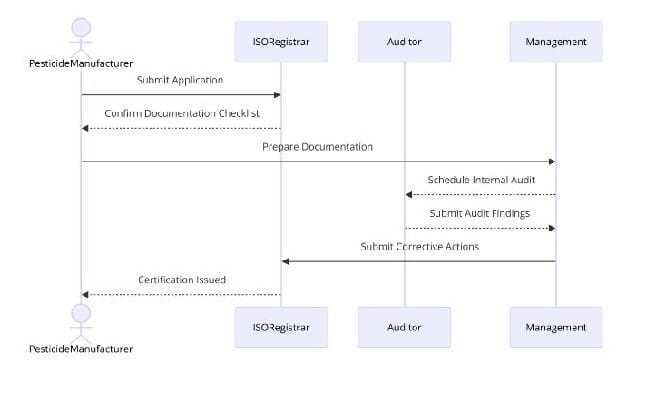
For ISO 9001:
- Develop and implement a robust Quality Management System.
- Document processes and maintain thorough records.
- Conduct regular internal audits and reviews.
- Focus on customer satisfaction and continual improvement.
For ISO 14001:
- Identify environmental aspects and impacts related to pesticide production.
- Establish objectives and targets for environmental improvement.
- Implement a system for waste management and pollution control.
- Monitor environmental performance and comply with applicable laws.
For ISO 45001:
- Conduct hazard identification and risk assessments.
- Develop a comprehensive health and safety policy.
- Train employees on safe handling of chemicals.
- Monitor workplace conditions and take corrective actions.
For ISO 22000:
- Implement a food safety management system in alignment with HACCP principles.
- Monitor supply chain integrity and pesticide quality.
- Maintain compliance with food safety regulations.
For ISO 17025:
- Establish a system for precise testing and calibration methods.
- Ensure laboratory competence and equipment accuracy.
- Document testing protocols and maintain quality control.
For reliable ISO certification for pesticide manufacturing, email [email protected] or dial +91-8595603096 to connect with our team.
Benefits of ISO Certifications for Pesticide Manufacturing
Adopting ISO standards offers pesticide manufacturers several advantages, including operational, economic, and reputational benefits:
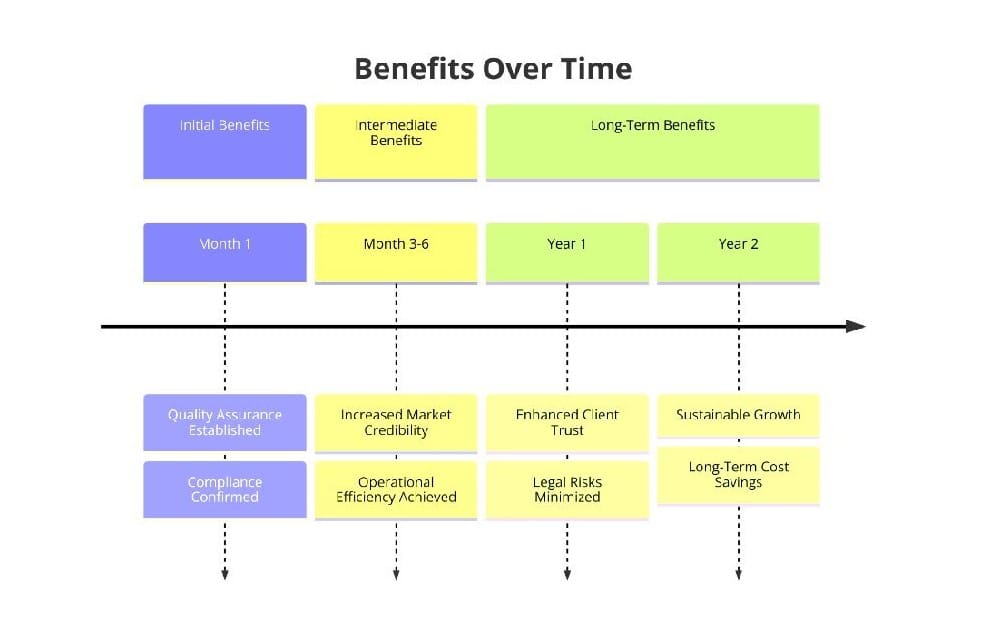
Compliance: ISO certifications ensure adherence to local, national, and international regulatory requirements, minimizing legal risks and penalties.
Product Quality: ISO 9001 and related standards enhance the consistency and reliability of products, resulting in improved customer satisfaction.
Environmental Stewardship: With ISO 14001, manufacturers can demonstrate their commitment to reducing environmental impact, a key consideration in today’s eco-conscious market.
Workplace Safety: ISO 45001 ensures safer working conditions, leading to fewer accidents and increased employee morale.
Global Market Access: ISO certifications act as a passport for entering global markets by meeting international buyer expectations.
Cost Efficiency: Improved processes, waste reduction, and resource optimization under ISO guidelines contribute to cost savings.
The pesticide manufacturing industry is evolving rapidly, with sustainability and innovation at the forefront. Lately, regulatory bodies are tightening environmental controls, pushing manufacturers to adopt cleaner production methods. Similarly, consumers are demanding eco-friendly pesticides, increasing the importance of ISO 14001 certification.
Research highlights a growing interest in bio-based pesticides, which require rigorous quality checks under ISO 9001 and ISO 22000. Adopting ISO certifications aligns businesses with these emerging trends, ensuring they remain competitive in an increasingly conscious market.
Achieve excellence and compliance in pesticide manufacturing with ISO certifications from Pacific Certifications. Our expert auditors are dedicated to helping your organization gain the trust and recognition it deserves. Contact us today to initiate your certification journey.
Pacific Certifications is accredited by ABIS, in case you need support with ISO certification for your Pesticide Manufacturing business, please contact us at [email protected] or +91-8595603096.
FAQs: ISO Certifications for Pesticide Manufacturing
What is ISO certification for pesticide manufacturing?
ISO certification for pesticide manufacturing involves adherence to international standards that govern quality, safety, environmental, and social responsibility aspects of production.
Which ISO standards are most relevant for pesticide manufacturers?
Key standards include ISO 9001 (Quality Management), ISO 14001 (Environmental Management), ISO 45001 (Occupational Health and Safety), ISO 22000 (Food Safety), and ISO 17025 (Testing and Calibration).
How does ISO certification benefit pesticide manufacturers?
ISO certification enhances product quality, ensures regulatory compliance, improves workplace safety, reduces environmental impact, and boosts global market access.
Can Pacific Certifications assist in implementation or training?
No, Pacific Certifications specializes in auditing and issuing ISO certifications. We do not provide consultancy, training, or implementation services.
Why is ISO 14001 crucial for pesticide manufacturers?
ISO 14001 helps pesticide manufacturers minimize environmental impacts, reduce waste, and meet sustainability goals, which are critical in today’s market.
How can I get started with ISO certification for my company?
You can start by contacting Pacific Certifications at [email protected]. Our team will guide you through the certification process.
Written by: Sony
Read More at: Blogs by Pacific Certifications
